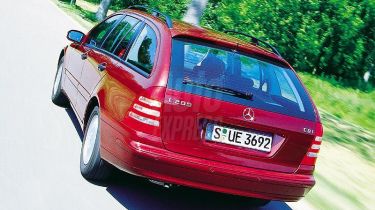Mercedes C200 CDI
If there's one thing that matters in the company car class, it's emissions. With the Government setting CO2 tax brackets at ever more stringent levels, the 'dirtier' models simply don't sell. Mercedes has been forced to take action, and the introduction of its cleaner, detuned C-Class oil-burner can't come soon enough.
Merc's newcomer is refined, flexible and nimble, and at £1,000 less than the C220 CDI, it makes more sense than any other diesel C-Class. But while performance is up to scratch, we expected better economy and lower emissions. And BMW's 320d is still cheaper, more powerful and more economical. Will the three-pointed star's pull be strong enough?
If there's one thing that matters in the company car class, it's emissions. With the Government setting CO2 tax brackets at ever more stringent levels, the 'dirtier' models simply don't sell. Mercedes has been forced to take action, and the introduction of its cleaner, detuned C-Class oil-burner can't come soon enough.
Despite the C200 CDI name, the 122bhp newcomer uses the same 2.1- litre engine as the existing 143bhp C220 CDI. Both will be sold alongside the 170bhp C270. Of course, reduced emissions mean a trade-off in terms of performance, and with the standard six-speed manual, official figures suggest that the 0-60mph sprint should take 12.2 seconds. However, in our own tests we recorded 11 seconds - not bad for an estate weighing 1.6 tonnes.
The new model also pulls well in the low to mid rev range, giving this CDI a surprising turn of speed. And while some diesels become less refined when they are reworked to optimise economy, the C-Class actually seems to have improved. Even when starting from cold, the new model is quiet and smooth, and rarely feels underpowered. All this has been brought about by the fine-tuning of the fuel system, incorporating injectors with seven holes instead of six, and high-pressure pumps.
If you can resist using all of the performance, 44.8mpg combined economy is achievable, which is no significant improvement over the C220 CDI. However, CO2 emissions of 167g/km place the Mercedes in the 20 per cent company car tax bracket - down by two percentage points. The good news continues on the price list. All C200 CDI models are £1,000 less than their larger-engined equivalents, putting the entry-level estate at £22,505.
So it all makes perfect sense - that is, until you go back to the C-Class's arch rival, the BMW 320d. In great-value ES specification, this machine is priced at £21,750, but comes with more than £2,000 worth of extras thrown in. The 150bhp BMW also offers better performance and even more impressive emissions, placing it in the lowest 18 per cent company car tax bracket. So while the Mercedes C-Class has cleaned up its act, the 320d still makes much more sense for business drivers.



